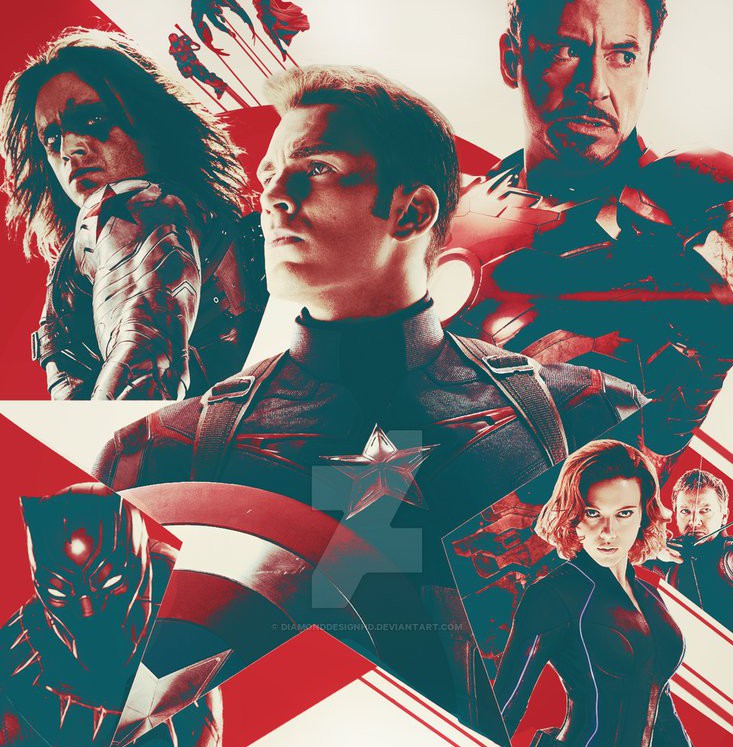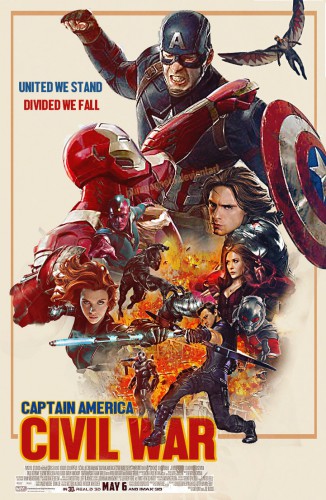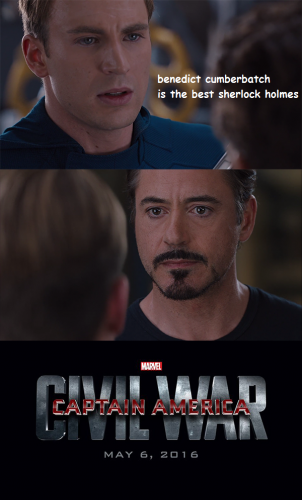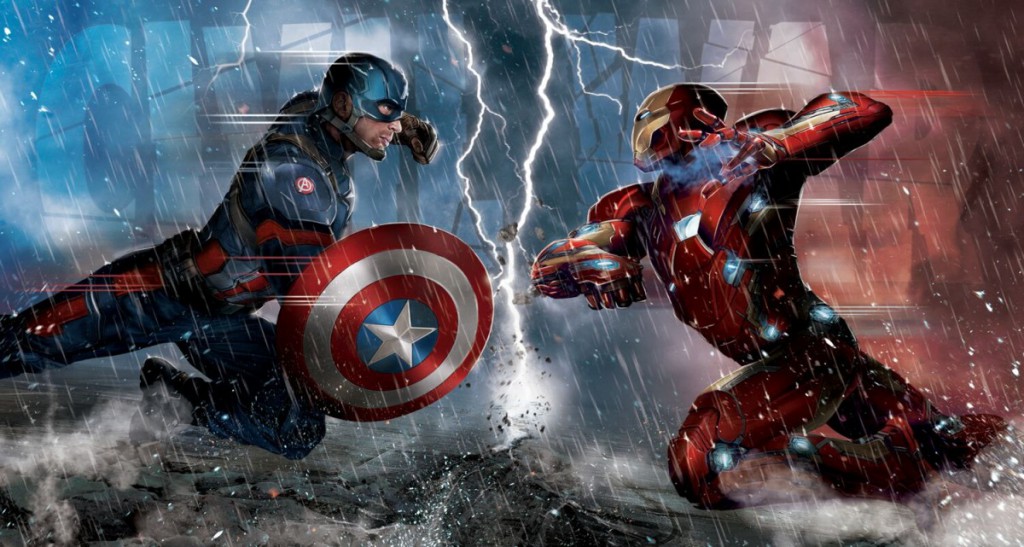
 How far would you go for your friend?
How far would you go for your friend?
Not an acquaintance, not an associate, not a work buddy: a friend, your companion, the counterpart whom you love. To what length would you go to protect her? Is there anything that would compel you to hesitate rushing to his side? What if the entire world were arrayed against him? Would you consider what the world had to say for even a second? Or would you grit your teeth and absorb its fury like a lightning rod for the one you love? Captain America: Civil War poses this question and shows us how far love will go to protect its own.
Civil War is the first film in Phase Three of the Marvel Cinematic Universe, and follows the course set by the climax of Avengers: Age of Ultron. Cap has been leading a new team of Avengers on missions around the world, protecting us from superpowered threats no one else can contain. Unfortunately, however, something goes wrong during an engagement in Nigeria and collateral damage makes the Avengers the focus of international scrutiny. The heroes who were once hailed as saviors are now feared the world over for the devastation that both draws them out and follows in their wake.
Tensions rise as the team deliberates upon whether or not to sign over control of the team to a UN panel. Guilt informs much of their reflection–have they been too reckless, too indiscriminate in their use of their abilities? Tony Stark, sick with grief over the enormous loss of life he is responsible for from Age of Ultron, insists that bypassing this type of accountability makes them no better than the villains they combat, whereas Captain America petitions the direct opposite: “What if this panel sends us somewhere we don’t think we should go? What if there’s somewhere we need to go and they don’t let us? We may not be perfect but the safest hands are still our own.”
Cap finds himself outnumbered as most of the team is persuaded that submitting to the Sokovia Accords is best for both themselves and the world. “It’s the best way to keep us together,” Natasha Romanov reassures him, clutching him close. The Avengers are the only family Cap has left, though the same holds true for most of the team. What we have witnessed over the course of ten prior Marvel films is more than big budget Armageddon scenarios and adrenaline-soaked action sequences; what we’ve seen is the development of a family. The Avengers are the collective entity that gives outsiders like Natasha and Wanda Maximoff and Tony Stark a place to belong, a place where their idiosyncrasies and faults can be sublimated into something bigger than what they are individually.

Because however brilliant they might be, however agile or breathtakingly strong or impossibly fast, they are not fully themselves without each other. Alone, their lives and skills make no sense, but together, as we saw in the final battle of Age of Ultron, covering one another’s blind spots and imperfections, drawing one another out of themselves, they are unstoppable. Family is what is at risk, and Cap’s isolation is emblematic of the fate awaiting each of them should the team fracture.
Those bonds still knit them together even in the midst of their disagreement, thankfully, and Cap can stand off to the side without resentment. While the draft of the Accords is being signed in Vienna, however, a terrorist strike against the UN provokes fresh discord when the suspect in the bombing is released to the public: the Winter Soldier–Cap’s oldest friend, Bucky Barnes. As the hunt for Bucky bitterly commences, Cap can do no other but race to his friend to rescue him from a world that cannot understand his plight. Bucky was once Steve’s champion back in the days before Super Soldier serums and secret government programs and arcane alien artifacts, stood by him when death stole Steve’s mother, fought alongside him when Steve was reborn as Captain America. “I’m with you, pal–to the end of the line,” was their chorus; like David and Jonathan, Steve and Bucky’s souls were sewn together more tightly than blood by itself could ever suffice. Bucky is Steve’s family, too; there was never a time he wasn’t. That love compels him to find his friend and save him, even at the cost of becoming a criminal and being hunted himself. Cap knows Bucky is a victim of the most terrible cognitive manipulation imaginable, and as the product of military-industrial manipulation himself he is able to be there for Bucky in a manner no one else can.
Certainly not Tony Stark, anyway, whose solutions to difficulties almost always boil down to upgrading or developing new technology. As we have seen since Iron Man 3, Tony is a bundle of insecurities held together by raw genius and to-hell-with-it insouciance, a seething morass of fears that repeatedly refuses to call a thing what it is and deal with it on its own terms.
Tony still presents his public persona of unflappable cool, but he is weary: weary of constructing solutions which seem to exacerbate the problems they’re meant to solve, weary of disappointing those he loves, weary of hurting those he loves, weary of himself. So we feel the shock of Tony Stark demanding the team submit to an authority outside of themselves–is this really Tony Stark?. Robert Downey Jr. delivers his finest performance as Stark in Civil War by submerging within an ocean of sadness that drenches his every move with the ferocity of a profoundly wounded, terminally lonely man trying to make things right as best as he knows how to.
The principal motivators we see informing his decisions are guilt and a suffocating need for atonement, an atonement he can’t imagine anyone else securing for him but himself. Tony wants to set right every wrong he’s ever done, wrongs he feels the more terrible for because he’s tried to do the right thing and yet repeatedly finds himself having to invest more and more in order to rectify. He’s had the hell beat out of him, and he doesn’t want the team to disband because of his mistakes–he needs his family. He can’t stop being Iron Man, can’t stop being the group’s financier and toymaker and public relations guru because he knows the world needs them just as much as he does. Tony thinks he’s holding the team together but Cap won’t allow him the luxury of that illusion. The Avengers they once were are over once their freedom to fulfill their calling is compromised, and it’s this incommensurability in ideals that blows open into a gaping divide.
 Tony’s needs and Cap’s loyalties can’t coexist in the political fallout, and the team splinters into factions, some dedicated to upholding the law and bringing Bucky to justice, others unhesitatingly looking to Cap as the only sane voice within this cataclysm.
Tony’s needs and Cap’s loyalties can’t coexist in the political fallout, and the team splinters into factions, some dedicated to upholding the law and bringing Bucky to justice, others unhesitatingly looking to Cap as the only sane voice within this cataclysm.
And so the fault lines we’ve seen shudder and shake in previous installments finally erupt into catastrophic upheaval as the heart and the brain of the Avengers come to blows. What’s fascinating is seeing the drives that impel certain members of the team to either Tony or Cap. Tony’s team is made up vengeance-seekers, impressionable youths afraid of letting down the world by failing to use their abilities well and dutiful soldiers who have oaths to keep. Cap’s team, however, is made up entirely of volunteers who believe in him, believe in his cause, who will follow him to the end of the line and even sacrifice themselves because they simply know it is the right thing to do. They know Cap is the guardian of this family, and as the battle lines are drawn we can see which side manifests the confidence of belonging; we see it in the way the respective heroes look to their champions with either reluctance or fear or unflagging determination. “What do we do, Cap?” Falcon asks as the teams array against each other. “We fight,” Cap answers, and his friends rally around him, ready to spend themselves to the utmost for him. And it is breathtaking.
The emotional upheaval of Civil War is staggering. The film satisfies so marvelously because it foregoes yet another world-ending extinction threat and instead opts for the intimacy of the end of a world a tightly knit group of friends had made together. The action sequences are stunning for how they instantiate the sheer wonder of being a superhero, how they capture the beauty and grace of our heroes’ movement, how they shear at our souls as we watch friends turn on each other, perhaps without hope of repair. Much of the film isn’t grandiose battle scenes, however, and instead focuses on the slow simmering agonies of the very human characters that make up the Avengers. Our heroes snipe and seethe and suffer as they grapple with the vicissitudes of public policy and very personal tragedy both. Witnessing the splintering of this team is awful to behold, as is Tony’s slow descent into a megalomania he can’t even see for what it is. But just as incredible is the steadfast loyalty we also see on display as new friendships and new familial bonds are forged in this ordeal.

There are many noteworthy scenes throughout Civil War, but the single most incredible moment of the film arrives in the climactic showdown between Steve and Tony. Stark grimly threatens Cap: “Stay down. Final warning.” To which Cap, battered and bleeding, resolutely straightens his frame, raises his dukes, and answers, “I can do this all day.” We see the toll the battle has taken upon his body and know he can’t. But Cap’s nature is to throw himself utterly into the center of peril, regardless of how outmatched he is. No inner voice of self-preservation cautions him from donating all of himself to the fight that has to be fought and we feel our hearts tear at the seams as we recognize there is nothing that’s going to stop him from protecting Bucky–he will die to save his friend.
In itself, it’s a moment supercharged with the electricity of deathless loyalty and selfless dedication. But what is truly brilliant about it is the inclusio it forms with the very first Captain America film, The First Avenger. There we saw scrawny Steve Rodgers telling off a loudmouth in a theater and getting mercilessly pummeled as a result. The bully clobbers Steve to the ground time after time, but Steve gets right back up, fists raised. “You just don’t know when to give up, do ya?” the creep asks. Steve shakes his head defiantly and says through a bloody smirk, “I can do this all day.” What’s different this time around is who is being saved. Bucky comes to Steve’s rescue that day when his valor outstripped his physical strength; now it is Steve, whose virtue and might now perfectly coincide, planting himself beside Bucky refusing to stand aside. All the extravagant resources of a Tony Stark will not make him back down: he will never stop. He’s with his friend to the end of the line.
This is the hero we need–one who knows our faults, knows our every wrongdoing, but never wavers in his love for us, who will hold nothing back from saving us. Cap is an icon of the one we need to be pummeled in our place, in whom grace and truth both inhabit seamlessly. So often when someone knows us, they won’t show us grace precisely for that reason. But Jesus, like Cap, will never stop fighting for you: his knowledge of you only amplifies his love for you. There will come a day when Cap can no longer withstand the punishment of our foes and he will succumb. But Jesus succumbed once for the grief-stricken Tony Starks of the world and the guilt-haunted Wanda Maximoffs and the exploitation-weary Winter Soldiers to absorb their dislocation and disease and make them part of his family. And he wants you. And he’ll be with you to the end of the line.

COMMENTS
15 responses to “To the End of the Line: Captain America: Civil War and the Demands of Love”
Leave a Reply














Brilliant review.
I’m honored you would say that, Ellery, thank you so much and I’m so happy you enjoyed it!
Nice work! The parallels to the “other hero” are compelling without being cliche. It would appear that the world is truly captivated by this hope!
“As the hunt for Bucky bitterly commences, Cap can do no other but race to his friend to rescue him from a world that cannot understand his plight.”
“Greater love has no one than this, that someone lay down his life for his friends. You are my friends if you do what I command you. No longer do I call you servants,a for the servant does not know what his master is doing; but I have called you friends . . .” Jn 15
“. . . and as the product of military-industrial manipulation himself he is able to be there for Bucky in a manner no one else can.”
“For we do not have a high priest who is unable to sympathize with our weaknesses, but one who in every respect has been tempted as we are, yet without sin.” Heb.4
“The principal motivators we see informing his decisions are guilt and a suffocating need for atonement . . .” “Cap is an icon of the one we need to be pummeled in our place . . .”
“That love compels him to find his friend and save him, even at the cost of becoming a criminal and being hunted himself.”
“Surely our griefs He Himself bore, And our sorrows He carried . . . he was pierced for our transgressions; he was crushed for our iniquities; upon him was the chastisement that brought us peace, and with his wounds we are healed.” Is. 53
Thank you for your kind words! I do think these overtones are viscerally present within the Marvel films and that’s one of the reasons I find them so heart-soaringly fantastic! I would never try to make the case that Kevin Feige et. al. went about trying to capture Christology and ecclesiology on celluloid, but all the same I think that’s what they’ve done by focusing on these elements that simply have this resonance because another Author stands behind them and intends them to pulse at the frequency they do. Thanks for making explicit those texts that substantiate the threads between Cap and Christ and thanks for reading!
Love that comment, “pulse at the (same) frequency.” For most of my life I have believed that God was waiting for me to get my act together. I thought Christianity was about trying to get on the heavenly wavelength by dialing into the divine frequency. Recently I have started to discover that the truly good news is that God is not waiting for us to rise up. up, up in our pursuit of his holy transcendence. It is surely a scandal but the best kind of scandal – the kind that breaks the spell of our our slavish spiritual ambitions! The God of Jesus Christ does what no self-respecting deity should ever do – he comes down from his transcendence just so he can get on our “wavelength.” This creator-redeemer is as you say, truly the Author behind every story, which explains why so many of our stories, “pulse at the same frequency” as the story of Jesus of Nazareth! Thanks again for starting this conversation!
The pleasure’s all mine, my friend! All I want to do is point out those pulses and tune others into those frequencies to behold the perplexing glory Christ has woven into this incredible home of ours, for our enjoyment and our consolation both, because man, do we need both! Always happy to start the conversation and to keep it going!
Good stuff Ian. Just saw the film today. My son (grown, 22) is a bit of a Marvel Universe fan and has schooled me on some of what is coming for Cap and the gang (no matter how much Disney tries to disnify it). There is a darkness that Cap enters into here beyond anything Thor left Asgard for (thankfully, because that would be silly :))
So you are being both illuminating and prophetic here. It struck me after seeing the film that it was Iron Man who was all about “America”, and law and (some warped sense of) freedom……….and Captain “America” (ironically) who was all about (as you mentioned) brotherhood and friendship, and Jonathan and David, and Sam and Frodo, and Sam and Jon Snow (couldn’t resist)……….there’s nothing uniquely “American” about Captain America in this film (I know I have friends who would disagree)……..Cap’s humanness and “image bearing-ness” (not his American-ness) are what makes the film.
I will think of him as “Cap” hence forth – just fits better.
Thanks, Howie! I love that we see Steve by the end stripped of all the trappings of Captain America: the stars and stripes uniform is gone, the shield… He simply is the champion of brotherhood and friendship, as you said, and he can give the atonement that Bucky and Tony both need, but Tony remains convinced he has to secure for himself. Steve’s self-expenditure carries the passivity of Bucky through to restoration whereas Tony’s ceaseless scheming after redemption only drives the team apart and curves him further into himself.
I find it incredibly powerful that the Man Out of Time sees the contemporary world and has begun to say, “You can keep it- no thanks.” So yeah, I love that the paragon of what America is *supposed* to be (I would say simply the ideal of virtue/heroism) turns his back on the symbols that have adorned his embodiment, not because he has turned on those ideals, but precisely because he embodies them more than ever. Thanks again, Howie, I love talking Marvel with you!
Wonderful! Tears… Thank God for Jesus!
Thank you, Wendy! Your comment fills me with glee because that means mission accomplished on my end! I pray you will vividly feel the favor God has lavished you with in Jesus as those tears roll down!
Thank you Ian, this review made me watch the movie.
I watched it yesterday, and my friends couldn’t understand why I was tearing during so many of the conversations. This review does such a good job of putting to words all I felt. The law, guilt, fear, unconditional love and brotherhood…It was all there.
I especially loved the scene where Bucky tells Cap, that he (Bucky) did all those bad things (murders etc) and Cap answered something like, it wasn’t you or you didn’t have a choice, to which Buck responds but I still did them. *Then silence* .How I wish I could own my guilt like Bucky, no excuses, no self pity. True recognition that I am a sinner.
This scene was such a clear reminder for me that we have sinned, and we have wronged the God who loved us. And simultaneously pointed me to His sacrifice and love. He never leaves us, He comes back to save us in the face of our accusers.Thank you Jesus
Oh and Tony, dear Tony. Angry, guilt-ridden Tony. He is like so many of us carrying this load unaware that Someone else longs to take it off our backs and it is not “on-us” to fix things. How timely is the message of the Cross for our day.
Finally,I am happy that friendships and fractions in the group weren’t neatly resolved like some Disney movie. Such a realistic picture of our own fractured and broken selves, all in need of a Saviour.
Hi Michelle! I’m so glad you decided to see and experience it and that you teared up as I do! Most recently I was so moved by Bucky reflecting on Cap’s friends dedication, how they all performed the rearguard action that allowed Cap and Bucky to get to the Quinjet, and he says, “I don’t know if I’m worth all of this.” Isn’t that us when we look too long at ourselves and not enough at Jesus? The burden of our introspection too regularly carries more force than the weight of glory in his love. Cap doesn’t examine the scales of Bucky’s righteousness against his wrongs to determine his worth: no, he loves Bucky, and will go to the end of the line to save his friend.
I love so much that Tony is such a prominent character in Civil War, and that his anger and guilt and grief twist him so thoroughly in directions consistent with his characterization as we’ve witnessed it so far in the MCU; it hurts so much seeing the “sanctification” we’ve seen take this dark turn and fizzle out, that he’s motivated to keep the family together and yet his every effort only fractures them further and leads to his friends’ harm.
Finally, I love how Hawkeye instinctively protects Wanda every moment he’s with her in spite of the fact that she is the single most powerful member of either team. It really is pointless for him to try to shield her: she ought to be the one covering him, putting herself between him and danger. But that’s Hawkeye’s character- the family man who risks himself to protect the ones he loves and incorporates into the family.
Anyway, so glad to hear your thoughts, and I hope the film continues to provoke fresh recollection of God’s love for you in Christ!
I missed a lot of backstory not having seen Cap Amer 2, Avengers Ultron, or the Iron Man series. However, my takeaway was this: the superheroes in this film reminded me of the so-called Biblical heroes (David, Samson, Elijah, Moses) in that they were so well equipped with supernatural strengths and hi tech armor, and yet they did not remain impervious to the normal human foibles that plague all of Adam’s kids. We see the family in “Civil War” unable to guard themselves against the normal sinful fallout of the heart – fear, mistrust, suspicion, confusion over loyalty, double mindedness, and the lust for vengeance. Ultimately, for all his resolute insistence that the team remain under ‘law’ and supervision (by the UN), when the moment of testing came, Starks with all his sophisticated body gear and weaponry could not protect himself from himself – he was unable to rationally keep his angered emotions in check when he discovered the truth about his dad. Thank God we serve a true Hero who surrounded himself with a family of 12 antiheroes (more akin to Jacob’s dirty dozen than the traditional Old T heroes we tend to venerate). The True Hero of the Scriptures was fully identified with our human frailties, fully clothed in our human nature, super imbued with Divine power, and yet perfectly kept his rational and emotional and psychological faculties in check… in order to save us from ourselves.
Ohhhhhhhhhhhhh, Jason! Jason! You gotta go back and watch the entire arc to see how we ended up where we did in Civil War! What are you doing this week? Let’s go in order and we’ll debrief (don’t worry, I’ll pause whenever we need to discuss something right that moment)!